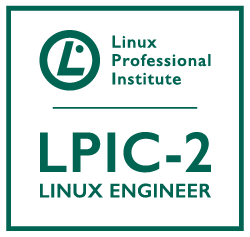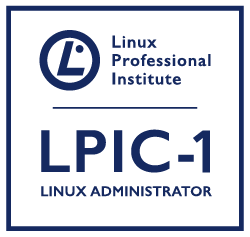Linux Professional Institute Certifications
Als weltweite Organisation bietet das Linux Professional Institute eine umfangreiche Zertifizierung für LINUX an. Diese besteht aus mehreren Levels und erfordert entsprechende Fähigkeiten beim Umgang mit Open Source Technologien.
Ein wesentliches Unterscheidungsmerkmal zu anderen LINUX Zertifizierungen sind die Herstellerunabhängigkeit und die neutrale Thematisierung der Aufgaben in Bezug auf die verschiedenen LINUX Distributionen.
Erfolgreich abgeschlossene Zertifizierungen
Nach Rücksprache ist auch gerne eine Überprüfung der Zertifizierung unter folgendem Link möglich:
https://www.lpi.org/verify

LPIC-2 LINUX Engineer
LPIC-201 Topics:
Measure and Troubleshoot Resource Usage
Predict Future Resource Needs
Kernel Components
Compiling a kernel
Kernel runtime management and troubleshooting
Customizing SysV-init system startup
System Recovery
Alternate Bootloaders
Operating the Linux filesystem
Maintaining a Linux filesystem
Creating and configuring filesystem options
Configuring RAID
Adjusting Storage Device Access
Logical Volume Manager
Basic networking configuration
Advanced Network Configuration and Troubleshooting
Troubleshooting Network Issues
Make and install programs from source
Backup operations
Notify users on system-related issues
LPIC-202 Topics:
Basic DNS server configuration
Create and maintain DNS zones
Securing a DNS server
Implementing a web server
Apache configuration for HTTPS
Implementing a proxy server
Implementing Nginx as a web server and a reverse proxy
SAMBA Server Configuration
NFS Server Configuration
DHCP configuration
PAM authentication
LDAP client usage
Configuring an OpenLDAP server
Using e-mail servers
Managing Remote E-Mail Delivery
Configuring a router
Securing FTP servers
Secure shell (SSH)
Security tasks
OpenVPN

LPIC-1 Administrator
LPIC-101 Topics
Determine and configure hardware settings
Boot the system
Change runlevels / boot targets and shutdown or reboot system
Design hard disk layout
Install a boot manager
Manage shared libraries
Use Debian package management
Use RPM and YUM package management
Work on the command line
Process text streams using filters
Perform basic file management
Use streams, pipes and redirects
Create, monitor and kill processes
Modify process execution priorities
Search text files using regular expressions
Perform basic file editing operations using vi
Create partitions and filesystems
Maintain the integrity of filesystems
Control mounting and unmounting of filesystems
Manage disk quotas
Manage file permissions and ownership
Create and change hard and symbolic links
Find system files and place files in the correct location
LPIC-102 Topics
Customize and use the shell environment
Customize or write simple scripts
SQL data management
Install and configure X11
Setup a display manager
Accessibility
Manage user and group accounts and related system files
Automate system administration tasks by scheduling jobs
Localisation and internationalisation
Maintain system time
System logging
Mail Transfer Agent (MTA) basics
Manage printers and printing
Fundamentals of internet protocols
Basic network configuration
Basic network troubleshooting
Configure client side DNS
Perform security administration tasks
Setup host security
Securing data with encryption
In meiner Freizeit verfolge ich viele interessante Projekte rund um das Thema LINUX wie zum Beispiel dem Raspberry Pi, Virtualisierungsverfahren wie XEN, KVM, Oracle VirtualBox und LXC.
Besondere Skills
- Level 201 und 202 Zertifizierung am Linux Professional Institute
- Level 101 und 102 Zertifizierung am Linux Professional Institute
- Zertifizierung für SUSE Linux Enterprise Server 10 und 11
- Oracle Weblogic Server
- Oracle Datenbank Administration und Tuning
- Oracle PL/SQL und SQL
- LINUX Advanced Administration
- Netzwerktechnik


